Janice Hardy's Blog, page 21
June 17, 2021
The Juggling Act! On Managing Multiple Projects
 By Bonnie Randall
By Bonnie RandallPart of The How They Do It Series
JH: Keeping up with multiple projects can leave a writer's head spinning. Bonnie Randall shares tips on how to manage and organize your writing projects.
A recent hit by Luke Combs is called “When It Rains It Pours” and YOWZA! That’s been my theme song lately.
I have a paranormal fiction project on the go, a series of children’s books that’s garnered a bid from a mainstream publisher, a consultative engagement with a Traumatic Response agency who’ve contracted several articles on COVID-as-a-traumatic-event from me, and if that wasn’t enough, two complete plots for a ‘drama-edy’ series I’ve been writing hit me out of the clear blue sky this past weekend.
Oh, and I write this column once a month.
How am I attending to all of this? How can I keep track of all of this?
Well, I certainly won’t profess to be an expert, but I will share what has been working so far, as perhaps some of these tips will work for you too.
1. Organizing My Time
Gone are the days of writing what I want, when I want. These days I triage, using the following formula:
What Has A Deadline? If a deadline—or multiple deadlines—are involved, they hit my calendars; electronic, and on paper, and the project with the nearest deadline takes priority over all…even if it might not be my preferred piece to write.
TIP: When you are writing something you have to write instead of something you want to write, make sure to set aside time in your day (even if it’s only 15 minutes!) to devote a bit of space for the project you are most passionate about. That could mean banging out a quick scene, a rapid exchange of dialogue, or even just a wee bit of research or vision-boarding (which I will speak to momentarily) for that project. Why do this? Because after a hard day at work we need a reward—in other words, after writing what pays the bills, our brain deserves a jolt on its reward pathway that helps it to remember why we love to write in the first place. It keeps us engaged in the craft, and reminds us that writing is an exercise that gives us joy.
What Projects Are The Money Makers? Perhaps you don’t have a deadline, yet know that one of the many pieces you’re working on will generate a bit of the green stuff. For me, those projects take precedent over any others because just like writing for joy is its own reward, writing for money is not too shabby either.
Which Project Am I Most Passionate About? Third on the triage is the project I am most passionate about or feel most ‘in the zone’ of. If there’s ‘flow’ when I’m in that setting or with those characters, that’s what’s going to generate the most pages, and a project with word count is a project closer to not only completion, but also to being off of my ‘to do’ list altogether.
(Here’s more with The Art of Juggling Multiple Writing Projects)
2. Organizing My Material
Time is one thing. Research, notes, backstory, scenes and, visual cues…those are quite another, and when multiple projects are on the go, things can get pretty ‘Post-It Notes Exploded In My Office’ in quite a hurry. Organizing materials is key—not just to keep all the stories straight, but also to save me time when I am pulling the file on any one particular story or article. Here’s some of the methods to my madness:
One Daytimer To Rule Them…. Yes, I mean old-school daytimer, and yes, that means pen and paper. I have one daytimer that is for writing ONLY. Deadlines go in there. Daily wordcounts for specific projects go in there. Notions for where or what to research—also in there. It is my project Bible that keeps my pieces present and accounted for.
TIP: I mentioned daily wordcounts. These are important because they don’t just provide visual evidence of accomplishments, they also serve to light the brain’s reward pathway up—for even a wordcount of 100 words is an accomplishment compared to no words at all, and the brain is CRAZY for accomplishments—just like a puppy getting a Beggin’ Strip. So keep your ‘reward tank’ filled by always noting word count. Over time, it will also help you track of which days of the week, times of the month, or seasons of the year are the most (or least) productive for you, and that builds some powerful insight into your own process.
Colors: Whether you use an electronic filing system or a retro paper system, colors are crucial. EVERY project needs its own, specific color—and every scrap of paper, article, list of hyper-links…all of it needs to be swiped with that project’s color in order to help keep you from going “This article is about mulching flowerbeds in West Virginia! What’s it doing in my Transylvania locusts pile?!”

The brain very quickly assimilates color-to-assignation That’s why color is such a helpful strategy in allowing material to be sorted quickly or found easily. So never start a project without immediately assigning it a color.
(Here’s more with Why OneNote is One-Derful for Writers)
3. Re-Orienting Cues
Beyond mere organization, one of the trickier things about simultaneous projects is re-orienting your ‘head-space’ from one to another—especially if you write multiple genres; fiction to non-fiction, paranormals to literary pieces. It can feel wildly disorienting when I move from the childish rhymes of my board-books back into the grim, paranormal world of my romantic hero and heroine. A couple things help me:
Playlists: Just like every project needs a color, every project also needs a playlist…or at least a theme song. Music is a powerful vehicle to pull forth memory (only smell/scent pulls forth a memory faster than music). So something I do to get ‘back into the groove’ of any one particular project is to queue up its playlist.
Vision Board: I mentioned this earlier (and you thought I forgot!). Vision boards can be detailed or simple, elaborate or plain. They can be pictures tacked onto poster-board or an electronic file of photos on your phone. Any and all ways you curate them, vision boards offer visual cues that place you into your project. So is there a pic of a café that resembles the one your characters swap gossip in? An actor who resembles your leading man or lady? A scenic shot of the geography where your story takes place? Those are the types of pics for your vision boards—a place you can ‘go’ to re-immerse yourself back into your project.
Okay! Whew! That’s all I’ve got.
Now it’s your turn: what tricks or tips did I miss (or might I not even know about) that you’d like to share that can help us all manage our multiple—and sometimes wildly eclectic—projects?
Fire Away!
 Bonnie Randall is a Canadian writer who lives between her two favorite places—the Jasper Rocky Mountains and the City of Champions: Edmonton, Alberta. A clinical counselor who scribbles fiction in notebooks whenever her day job allows, Bonnie is fascinated by the relationships people develop—or covet—with both the known and unknown, the romantic and the arcane.
Bonnie Randall is a Canadian writer who lives between her two favorite places—the Jasper Rocky Mountains and the City of Champions: Edmonton, Alberta. A clinical counselor who scribbles fiction in notebooks whenever her day job allows, Bonnie is fascinated by the relationships people develop—or covet—with both the known and unknown, the romantic and the arcane.Her novel Divinity & The Python , a paranormal romantic thriller, was inspired by a cold day in Edmonton when the exhaust rising in the downtown core appeared to be the buildings, releasing their souls. The series continues with her newest release, Within the Summit's Shadow .
Website | Blog | Facebook | Goodreads |
About Within the Summit's Shadow
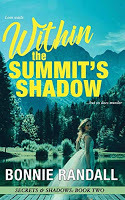 HE’S HAUNTED
HE’S HAUNTED
Andrew Gavin knows he's a train wreck. Before he even became a detective, Andrew’s first trauma—at only seventeen—occurred when he witnessed a gruesome suicide. Ever since, a delusion he calls The Dead Boy appears when his anxiety spirals too close to the edge…
HE’S HUNTED
Goaded by The Dead Boy, Andrew shoots and kills an unarmed teenage bully in what appears to be a fit of rage. Suspended from the force, and awaiting a possible murder charge, he retreats home to the Rockies. There The Dead Boy taunts him daily. Except…
HE HUNGERS
Elizabeth McBrien, the childhood sweetheart he scorned, is back home in the mountains too, and shocks Andrew by revealing that she too sees The Dead Boy. Astonished that the spirit is not a delusion, but real, Andrew is further unnerved when he learns that The Dead Boy has ‘befriended’ Kyle, a gravely ill kid Elizabeth adores.
Now it's specter vs. cop in a race to save Kyle's life, and The Dead Boy insists that Kyle’s survival hinges on secrets Andrew holds about that long-ago suicide. Yet Andrew knows the entire truth will destroy him, and also annihilate any new chance he may have with Elizabeth. But they are running out of time; Kyle is dying, and The Dead Boy is ready to sacrifice anything in order to once again walk among the living…
“Within the Summit’s Shadow is a paranormal romance unlike any you’ve ever read. Set in the resort town of Jasper amid the splendor of the Canadian Rockies, this novel combines love, mystery, and a persistent, deeply psychological, very personal haunting. Randall really delivers the goods with this one.”
Amazon | Barnes & NobleWritten by Janice Hardy. Fiction-University.com
Published on June 17, 2021 03:00
June 15, 2021
After the First Draft: Revising Your Plot
 By Becca Puglisi, @beccapuglisi
By Becca Puglisi, @beccapuglisiPart of The How They Do It Series
JH: A solid story structure makes revising a novel a lot easier. Becca Puglisi discusses the three-act structure and offers a handy plot checklist to work with.
Becca Puglisi is an international speaker, writing coach, and bestselling author of The Emotion Thesaurus and other resources for writers. Her books have sold over 650,000 copies and are available in multiple languages, are sourced by US universities, and are used by novelists, screenwriters, editors, and psychologists around the world. She is passionate about learning and sharing her knowledge with others through her Writers Helping Writers blog and via One Stop For Writers—a powerhouse online library created to help writers elevate their storytelling.
Website | Goodreads | Facebook | Twitter |
Take it away Becca...Continue ReadingWritten by Janice Hardy. Fiction-University.com
Published on June 15, 2021 03:00
June 12, 2021
WIP Diagnostic: Is This Working? A Closer Look at Tension in a Mystery Opening
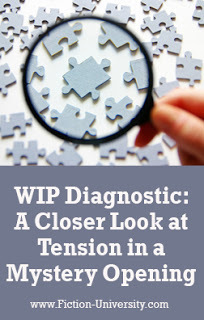 Critique by Janice Hardy, @Janice_Hardy
Critique by Janice Hardy, @Janice_HardyWIP Diagnostics is a weekly column that studies a snippet of a work in progress for specific issues. Readers are encouraged to send in work with questions, and we diagnose it on the site. It’s part critique, part example, and designed to help the submitter as well as anyone else having a similar problem.
If you're interested in submitting to WIP Diagnostics, please check out these guidelines.
Submissions currently in the queue: Six
Please Note: As of today, critique slots are booked through July 24.
This week’s questions:
1. Is there enough tension to make you keep reading?
2. Are the characters clear and differentiated?
3. Does the showing reveal character and propel plot?
Market/Genre: Murder Mystery
On to the diagnosis…
Continue ReadingWritten by Janice Hardy. Fiction-University.com
Published on June 12, 2021 05:03
June 10, 2021
Writing: When Things Get Tough
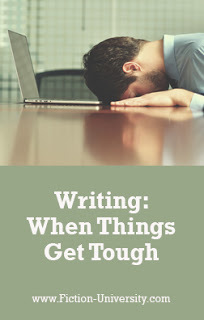 By Dario Ciriello, @Dario_Ciriello
By Dario Ciriello, @Dario_Ciriello Part of The Writer's Life Series
JH: No job is perfect, and being a writer has its bad days. Dario Ciriello discusses the darker times writers face, and why we still keep writing.
Sometimes writing is so difficult that all you can do is laugh. The laugh is not one of humor, but more like that of Holmes as he goes over the Reichenbach falls, or perhaps one of Lovecraft’s characters as he fully realizes the depth of the unspeakable cosmic horror which is about to devour his soul.
Every seasoned writer is, I think, deeply mistrustful of anyone who claims to love the process—I mean the entire process, especially the in-the-trenches bayonet-work, when you’re locked in a life-and-death struggle with yourself and every fiber of your being screams give up, surrender, you can’t win, because each sentence you craft, each line of dialogue, is worthless, stilted nonsense. At these times there’s nothing to love about the process, and to hell with inspirational quotes and touchy-feely nonsense. All you have is will and determination, and it had better be up to the task.
Continue ReadingWritten by Janice Hardy. Fiction-University.com
Published on June 10, 2021 03:00
June 8, 2021
4 Ways to Hook Readers on Your Series
 By Laurence MacNaughton, @LMacNaughton
By Laurence MacNaughton, @LMacNaughtonPart of The How They Do It Series
JH: Not every reader starts a series with Book One. Laurence MacNaughton shares tips on how to hook your reader no matter which book in the series they start with.
Wouldn't it be great if every reader started your series with the first book and continued onward in order? But sometimes readers start in the middle of your series, especially if it's in paperback, and they can easily get confused. You need to hook them on your story quickly.
To do that, you need to make sure that every book in your series invites new readers into your world and brings them up to speed quickly. And you have to do it without boring your existing readers. It's a tall order, but I'll show you how.
I ran into this problem with A Kiss Before Doomsday , the second book of my Dru Jasper urban fantasy series. After the first book made a big splash on the front table at Barnes & Noble, we followed up with a big publicity push on the second one. For many readers, Book Two was actually their entry point into the series.
Continue ReadingWritten by Janice Hardy. Fiction-University.com
Published on June 08, 2021 02:28
June 7, 2021
Beware the Vague Goal When Outlining a Scene
 By Janice Hardy, @Janice_Hardy
By Janice Hardy, @Janice_Hardy Vague goals can trick you into thinking your scene is ready to write when it really isn’t.
Vague goals are nobody’s friend. They creep into our scenes, make us think our structures (and stories) are solid, but they’re really undermining those stories, especially in the drafting stage. “Stop the bad guy” tells us noting about what will actually transpire in a scene. Neither does “Protect the witness.” How is the protagonist going to do that?
Then there’s the king of the vague goals—“Survive the threat.” As Kristin Lamb hysterically puts it, her goal every day is to not die. Every protagonist in every book has this same goal. What the threat is and how the character survives it is what creates the plot and tells the story.
Continue ReadingWritten by Janice Hardy. Fiction-University.com
Published on June 07, 2021 03:58
June 5, 2021
WIP Diagnostic: Is This Working? A Closer Look at Voice and Hooks in a Literary Opening
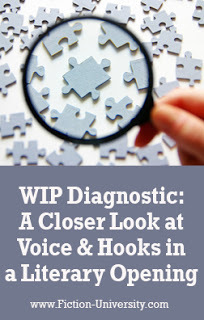 Critique by Maria D'Marco
Critique by Maria D'Marco WIP Diagnostics is a weekly column that studies a snippet of a work in progress for specific issues. Readers are encouraged to send in work with questions, and we diagnose it on the site. It’s part critique, part example, and designed to help the submitter as well as anyone else having a similar problem.
If you're interested in submitting to WIP Diagnostics, please check out these guidelines.
Submissions currently in the queue: Five
Please Note: As of today, critique slots are booked through July 10.
This week’s questions:
1. Does this opening work?
2. Does the voice sound unique to the reader to get hooked?
Market/Genre: Literary Fiction
On to the diagnosis…
Continue ReadingWritten by Janice Hardy. Fiction-University.com
Published on June 05, 2021 03:00
June 3, 2021
How to Include Mental Health Issues in Our Fiction
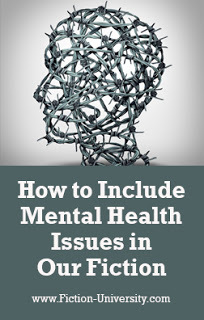 By Bethany Henry
By Bethany HenryPart of The How They Do It Series
JH: When writing about mental health issues, it's important to get it right. Bethany Henry shares eight tips on how to write about mental health in a healthy—and helpful—way.
Bethany Henry writes fantasy novels, and blogs about writing and wellness at bethany-henry.com. When not writing, she can often be found on the frisbee field, drinking tea, or reading picture books with her two little girls. Sign up for her email list for weekly posts on writing craft—along with fun extras like quotes and freebies.
Website | Blog | Facebook | Pinterest | Email List
Take it away Bethany...Continue ReadingWritten by Janice Hardy. Fiction-University.com
Published on June 03, 2021 04:25
June 1, 2021
5 Tips for Writing a Novella that Wows Readers
 By Sarah Skilton, @Sarah_Skilton
By Sarah Skilton, @Sarah_SkiltonPart of the Focus on Short Fiction Series
JH: Some ideas don't quite have the legs for a full novel, but they'd make perfect novellas. Sarah Skilton shares tips on how to write a memorable novella.
Sarah Skilton is the author of two critically acclaimed young adult novels, Bruised and High & Dry , and was a 2019 Edgar awards judge. For adults, she's written a murder mystery, Club Deception , set in a fictional underground magic club; and a romantic comedy, Fame Adjacent , about a former child star on a mission to confront her famous castmates at a 25th reunion show. Under the pen name Tash Skilton, she is the co-author of Ghosting: A Love Story , which was published in seven countries and six different languages, and which Kirkus called, "An energetic romance that would make Nora Ephron proud."
Sarah’s first novella, “Mind Games,” appears in the rom-com anthology Summer in the City , alongside authors Lori Wilde and Priscilla Oliveras. There’s nothing like summer in Manhattan. The days are long and the nights are even longer. But when the lights go out on the city, fireworks explode...!
Website | Goodreads | Facebook | Twitter | Instagram|
Take it away Sarah…
Continue ReadingWritten by Janice Hardy. Fiction-University.com
Published on June 01, 2021 05:01
May 31, 2021
6 Questions to Ask Before You Join a “Crit-as-You-Go” Critique Group
 By Janice Hardy, @Janice_Hardy
By Janice Hardy, @Janice_Hardy
Some critiques can cause more harm than good.
Lisa Cooper Ellison did a guest post on Jane Friedman’s blog warning writers about chapter-by-chapter critiques. It’s worth reading, but she essentially said that getting feedback on a few chapters of the novel at a time as you write it instead of the critiquer reading the entire novel at once was more detriment than benefit (there’s more of course, but this is the part that I’m referring to in this post).
I agree 100%. I also disagree 100%.
Yes, I know, that’s impossible, but this isn’t a yes or no issue. I’ve been in a “crit as you go” group for a couple of years now, and I love it. It’s been incredibly useful for me and has increased my productivity. But I also understand that I’m at stage in my writing where I can do this successfully, while someone just starting out, or someone with a different process, might fail in a group like this. Even a pro can struggle in this type of group if they write to satisfy the group and let it sway how the novel develops.
Continue ReadingWritten by Janice Hardy. Fiction-University.com
Published on May 31, 2021 03:00



